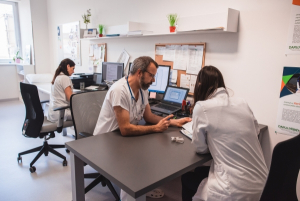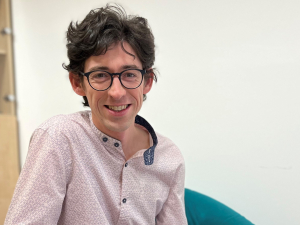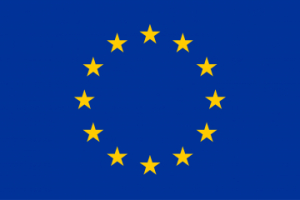Through the eyes of a psychologist: What is life like for people who have undergone cancer treatment in their childhood?
February 15th is the annual International Childhood Cancer Day. This year, at the International Clinical Research Center (ICRC), we want to highlight the needs of cured paediatric patients who are dealing with the consequences of their treatment in adulthood.
Since 2016, the Outpatient Clinic for Oncology Follow-up Care under the direction of Tomáš Kepák, M.D., Ph.D., has been operating in the premises of St. Anne’s University Hospital Brno (FNUSA). It offers care to patients who have undergone oncological treatment in childhood. It responds to the development of knowledge about the long-term effects of treatment on the later state of immunity, cell aging, or the premature development of chronic diseases. In line with the current European trends, the follow-up care services are now moving into the psychosocial field alongside purely medical care. In particular, our clinic has expanded its services to include psychological care and nutritional counselling. In this way, we also support patients in taking responsibility for their own health care in a broader sense.
What problems do patients face? How do they feel in relation to the general population? And what are their specific needs? One of the new team members, psychologist Jakub Kozák, offered us his insights.
Photo: Mgr. Jakub Kozák
How did you come to work at the Outpatient Clinic for Oncology Follow-up Care at FNUSA?
Dr. Kepák invited me to join the outpatient clinic as a member of the future psychosocial team, in order to map the needs of patients from a different perspective than has been customary so far. The current European trend is similar. Dr. Kepák and I know each other from the Department of Paediatric Oncology at the University Hospital Brno. I have long been involved in the field of child psychology and psychopathology. We felt that cooperation could be beneficial, even though the practice primarily focuses on adults, because many topics overlap with our category of patients.
What is your role within the clinic?
I offer screening for mental health needs to patients. If I spot a problem that falls within my area of expertise, I try to treat it in some way. Acute conditions can be dealt with on a short-term basis. However, because we do not yet have the capacity for long-term care, we then try to transfer patients to regional specialists as close to where they live as possible. Clients come to us from a wide area of Moravia, sometimes even from Bohemia. Our aim is to create a network of collaborative centres with colleagues from other outpatient clinics to provide the support patients need.
So, at this point, are you able to offer patients the specific names of local colleagues to take over their care?
In some places, yes, in others we’re still making contacts. Networking is a longer-term process. There are also areas where psychological care is generally scarce, but we are trying to work with that.
Do you offer services to all patients of the clinic, or does it depend on referrals from doctors?
I try to reach out to everyone. If I am unable to meet someone directly in the outpatient clinic, for example because of the schedule of examinations that patients undergo with us, my colleagues mention the possibility of a psychological consultation.
What age group do you work with?
I meet with the whole spectrum of people. We have young adult patients, five years out of treatment, but also older patients, in their forties and fifties.
What difficulties do patients most often come in with?
With younger patients, around the age of 25, we often deal with their entry into adulthood, the possibility of becoming independent and setting rules towards their parents (family). A parent whose child has been in direct danger to life may subsequently be hyperprotective, that is, trying to protect their child too hard. This is a natural consequence of the treatment; however, it is important for the young adult to realise independence in life as far as possible, not to be bound by the anxious care of the parent or their efforts to control potential risks.
Another set of difficulties are concerns about the future, issues of family planning, often reproductive health and the very possibility of having children at all. There is also the fear of recurrence of the disease and the concern about the illness of one’s own child. There are often anxieties that may already stem from the personality make-up of a particular individual, and these can be greatly exacerbated by treatment.
Do you ever encounter the opposite spectrum of experiences, e.g. positive patients who are able to take life in their stride because of their distressing experience?
I’m glad you mention that. In our work, we always hope that even when a child is hit by such a powerful experience, it may not always lead to permanent major limitations and distress, but it can move him/her on. When a patient like that comes along, it’s always a wonderful encounter. Dr. Kepak often calls our practice a “clinic of joy” when we see many patients, who have gone through challenging treatment, reach important life milestones, even though they may have doubted it during treatment. There are also those who completely reassess their value ranking. This is especially true for those who are affected by treatment during adolescence. They think a lot about their situation, and I dare to say they often come out enriched.
Is it possible to distinguish traumas and experiences related to treatment from others? Or is that not even desirable and you approach your patients’ problems holistically?
We cannot always be sure that a certain problem is primarily related to the treatment, but we try to make that distinction. We do, however, take it as a kind of extra for patients with this difficult experience, that they have the opportunity to address their issues, if they wish to do so. This relates both to memories and to their own overall perception of their quality of life in the current period. Our limit for now is our capacity. So, we need to consider the extent to which we will develop support within our outpatient clinic and when we will engage with a network of other professionals.
Do you also work with patients’ families?
Adults are in varying degrees of autonomy in the context of their relationship with their parents. Our patients have at some point used parental support quite extensively on various levels and there comes a time when it would be desirable to gradually loosen this bond. Sometimes it is successful, the parent keeps his distance and gives the child the space to find the optimal degree of autonomy naturally. Other times it is less successful, and so we try to work with that. We also have a group of patients who have more significant health limitations due to treatment, such as cognitive or motor impairment. Some parents sacrifice so much that they permanently subordinate their lives to the child’s needs, they are available to the child, they care for the child nonstop. We then address the model of how patients could exist without the majority presence of the parent, and thus have the possibility of realization without parental support.
What about partner relationships?
We are addressing that just occasionally, for the moment. There are questions about the extent to which the partner needs to be informed about the patient’s past. I remember a case where this information did not come up at all and we discussed to what extent the patient wants to inform the other person about the treatment at that stage of the relationship, what his/her concerns are and how this topic can be opened in partner communication.
What kind of mental hygiene do you recommend to your clients?
All of us, regardless of the presence of serious illness or treatment, benefit from taking care of our own resources. Thus, I find it important to think of my own body and mind in self-care, while doing at least a little something every day to feel good. It doesn’t take a lot of time or energy, just that focus and setting aside the essential minimum is very important. Part of it is prevention, striving for a healthy lifestyle. In addition, with our patients, my goal is always to pinpoint an area where they can experience usefulness, so that they can live well and see their own value even with a possible handicap.
You mentioned the European trend towards comprehensive care for cancer patients and survivors. It reminds me of Prof. Koutecký, the founder of paediatric oncology in the Czech Republic, talking about the need to see patients in their whole context, including psychological support. Do you think we are succeeding?
I have a lot of inspiration in palliative care, where this trend of a holistic approach is very strong. I now see a similar direction in our efforts in the clinic. We have to try to do this, even if it sometimes means facing various attitudes of other professions towards psychological work, perhaps some prejudices. Part of this is due to the less tangible way we work. And I hope that we are succeeding – this must be decided by patients and colleagues from other disciplines. In our clinic we are certainly making efforts to achieve it.
 Photo: the Outpatient Clinic for Oncology Follow-up Care at FNUSA, in the middle MUDr. Tomáš Kepák, Ph.D.
Photo: the Outpatient Clinic for Oncology Follow-up Care at FNUSA, in the middle MUDr. Tomáš Kepák, Ph.D.
Are you the only clinic in the Czech Republic with similar services?
There is another center at the Motol University Hospital in Prague, with which we cooperate. We are currently going there for an internship to harmonise care concepts and to discuss foreign trends.
Does your work have an outreach to the public or do you develop recommendations for professional societies?
We are just starting with outreach. For example, we are in contact with patient organisations. I also see the importance of education in schools. We know of patients who have had a very difficult return to school. There is a need for an appropriate educational approach to the specific needs of the child in/after cancer treatment, but also a need to work with the class and integrate the individual who has gone through a challenging experience – often threatening their own life and its long-term quality.
What topics do you think are taboo in society today in relation to childhood cancer treatment?
I see a certain degree of disadvantage for the group of cured patients. We are trying to work towards equal opportunities for them. Many cured patients are actually healthy after cancer treatment, yet they struggle with discrimination. This concerns, for example, the possibility of arranging a mortgage, insurance, employment opportunities. These people want to live a full life and have a perspective.
Is there a story that sticks in your mind?
I can think of one outpatient who was significantly affected in his own self-sufficiency by treatment. We are now working on getting parents to allow themselves to seek appropriate help. We are addressing how much further care they will provide and to what extent they will use social services support. The reason this particular case comes to mind is the poignancy with which parents have to process major losses in their lives. One minute they are raising a child they believe will take care of itself in adulthood. Then a moment comes that somehow takes away that relative security and they have to reorient their approach. They are also faced with the fact that the social system cannot offer them enough support. We want to seek the highest possible level of life fulfilment for these patients, for the families. I think that as a society we should do more about this.
The stories you encounter must often be challenging. How do you maintain your own mental health?
I have a certain habit of working with stories that I keep within professional boundaries. But I also want to mention my family, who are a great support for me. I consider it a great gift, I would say a “life bonus”, that my wife and children carry with me this very service to people with difficult life stories. It certainly changes not only my outlook on life and the world, my whole family shares it with me. At the same time, I couldn’t do without my personal resources, which for me are music, the creative process in general, and sports.
How can clients find your help? If we wanted to conclude by offering a helping hand to those who are hesitant or unfamiliar with aftercare options?
We are working on better communication of our services externally. As part of the process of completing treatment, patients are given information about where they can access follow-up care. We also have our own space on the FNUSA website and work with patient associations. If patients feel the need and are not yet in the follow-up system, I can definitely recommend it. In hyperbole, we compare it to technical inspection of a car – we offer a check of overall health, including my screening of mental fitness. We will certainly be happy if patients take advantage of this.
Thank you for the interview.
For more information and contacts for making an appointment at the Outpatient Clinic for Oncology Follow-up Care at FNUSA, please visit: https://www.fnusa.cz/pro-pacienty-a-navstevy/pracoviste/dispenzarni-onkologicka-ambulance/ (CZ only)
The clinis’s activities were part of the European PanCareLIFE project, which set out to improve the quality of life of children and young patients cured of cancer throughout their lives. This is now being continued by the follow-up project PanCareFollowUp, supported by the Horizon 2020 programme of the European Union (grant no. 824982).



